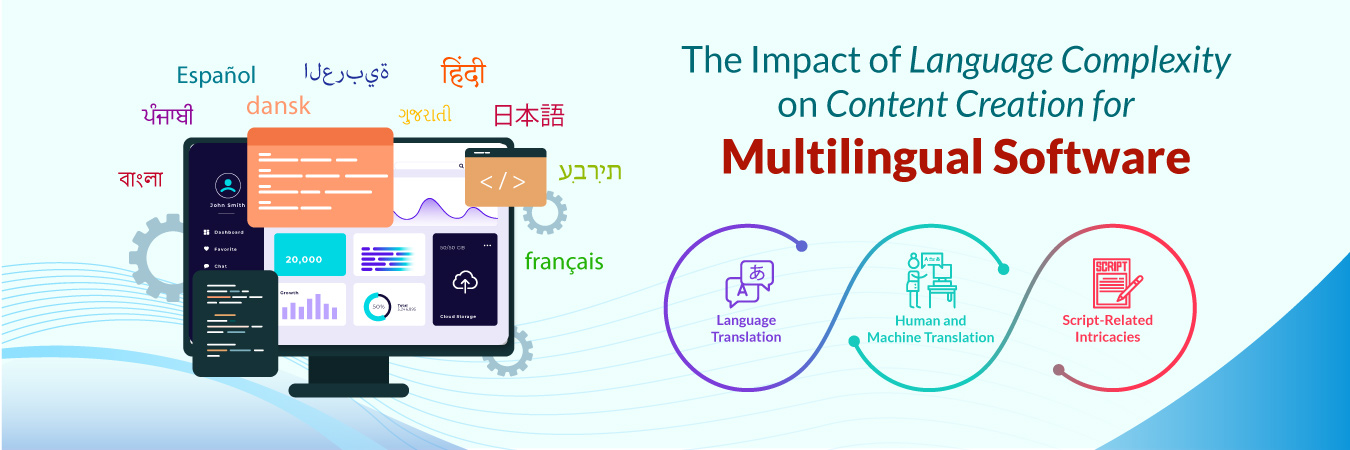
The Impact of Language Complexity on Content Creation for Multilingual Software
1. Language Translation for Multilingual Software
Translation isn’t a straightforward task. To many, it may appear to translate a particular sentence by every word. But translation is much more than transliteration and, thus, a complex activity with several associated aspects.
For instance, translating a sentence from one language to another has various dimensions, like the sentence’s meaning, purpose, the length of the sentence, the scripts involved, cultural implications, etc. A translator should ensure that the translated product is meaningful while, at the same time, is accurate and appropriate.
Accordingly, creating content for multilingual software requires you to have translators who aren’t merely specialists in a particular language but also understand the cultural impact related to the content they create. Struggling with the complexities of a particular language and limiting the work to translation can impact the overall content quality. The purpose of creating content for the software product may get defeated.
2. Choosing Between Human and Machine Translation
That’s another complexity, or rather, we’d say, a dilemma companies get stuck in a while dealing with translation. Human translations are more accurate and meaningful. But they are time-consuming. On the other hand, machine translations are quick. However, the translated product might not necessarily be relevant to the context and accurate.
Making a decision between human and machine translation isn’t a language-related complexity. However, being unable to choose between these two could lead to project delays and retard the project’s pace. Here, leveraging a blend of human and machine translation can prove the right approach and strike a balance between time and quality.
3. Script-Related Intricacies
Script uniqueness and peculiarities are a couple of other complexities associated with languages and language translations. Dealing with languages that follow a particular script, for instance, English, French, German, Spanish, etc., might not be as challenging. Although yes, spelling and corresponding words will still pose a challenge.
With regards to the latter, for example, the word now in English is maintenant in French. Thus, a small word that occupies little space in English requires more space while writing content in French. These concerns might appear trivial, apparently. But they can make a translation or content creation fairly challenging.
However, that might still be manageable. What’s more challenging is individual scripts. For instance, consider translating content from English to Hindi or Arabic. In situations like these, everything from the sentence length to the format, selection of words, etc., changes. The inability to deal with these facets can royally affect the content creation. It will affect the content’s meaning and relevance, thus rendering the entire process practically purposeless.
Looking to develop multilingual software for a specific target market anywhere worldwide? Choose FidelSoftech. We are one of the leading players across the localization sector. Our extensive expertise across 100+ Indian and foreign languages, access to technology, and domain specialization enable us to deliver the most complex of localization projects with ease and grace. Besides, our portfolio comprises localization for enterprises from multiple domains, including banking, education, hospitality, etc.
All you have to do is connect with us on +91-20-49007800 or discuss your requirement with us at . Fill the form and get in touch if you have any questions or doubts and we will get in touch with you shortly. discuss your needs with our experts.
Ref. No – FB05231064
Related Blogs
Choosing Between Outsourcing vs Staff Augmentation for Software Development
Are you looking to develop a software solution for your company but wondering whether to go for outsourcing vs staff augmentation? Then, let us tell...
Custom Accounting Software Development for Industry-Specific Needs
Custom accounting software development becomes essential when businesses rely on accounting systems that promise universal compatibility,...
Upgrade Your Legacy Systems Using PHP 8.4 New Features
PHP gets even better! Yes. While already great, the latest PHP 8.4 release is yet another giant leap forward for the programming language. However,...



